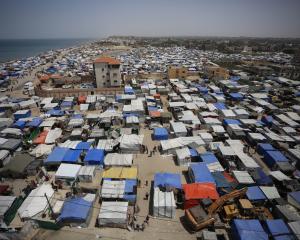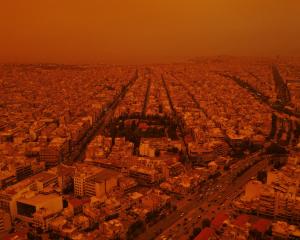The United States conducted a new round of air strikes against Islamic State militants in northern Iraq and moved some US diplomats out of its consulate in Arbil as Republicans slammed President Barack Obama's intervention as ineffective.
Republican Representative Peter King of New York, echoing other critics of Obama's policy in Iraq, criticized Obama for insisting he will not send US ground troops to combat the militants, adding the United States has been too timid so far.
"We should take nothing off the table. We (should) start off with massive air attacks," King, a member of the US House of Representatives Homeland Security Committee, told NBC'S "Meet the Press" programme.
"I think doing them from aircraft carriers is limiting them. We should use bases in the area so we can have much more sustained air attacks. We should be aggressively arming the Kurds," King added.
Last week, Obama launched a campaign of US air strikes and humanitarian air drops in areas where militants, who have seized large swathes of Iraq since June, are threatening religious minorities and encroaching on Arbil, the capital of Iraq's autonomous Kurdish region.
The moves are the first direct US military action in Iraq since Obama pulled US troops out in 2011. Obama, who campaigned on ending the long, bloody US war there, has been reluctant to wade back into Iraq. He has stressed the overall solution for the country rests with Iraqi political leaders and is urging them to end long-running feuds and form an inclusive government.
On Sunday, the US military said US planes had conducted air strikes on Islamic State targets for the third straight day. The latest strikes aimed to help Kurdish Peshmerga forces defend Arbil, the site of a US consulate and a US-Iraqi joint military operations center.
The US military's Central Command said drone aircraft and fighter jets fired on armed vehicles and a mortar position belonging to fighters from Islamic State, which is an offshoot of al Qaeda.
The State Department's announcement several hours later that it had removed some staff from the nearby Arbil consulate showed US concern over the severity of the threat to US personnel and to Iraq's viability as a state.
In June, the United States moved some staff from the giant, bunker-like US embassy in Baghdad to Arbil, which previously had been known for better security than the Iraqi capital, to the southern city of Basra and to Amman, Jordan.
On Sunday, the department said it had sent "a limited number of staff members from the Embassy in Baghdad and the Consulate General in Arbil to the Consulate General in Basra and the Iraq Support Unit in Amman."
It did not say how many staff had left Arbil or how many remained. About 40 US military personnel are now in Arbil at a joint US-Iraq military operations center.
The White House is still grappling with political fallout from a 2012 attack on a US facility in Benghazi, Libya, that killed the US ambassador there and three other Americans.
Obama said on Saturday a top priority was to keep Americans safe, adding, "We're not moving our embassy anytime soon. We're not moving our consulate anytime soon."
ERASED BOUNDARIES
Senator John McCain of Arizona, a leading Republican voice on foreign policy, called for air strikes not only in Iraq but in Syria, where the Islamic State has gained strength since the conflict in Syria began in 2011. "They have erased the boundaries between Iraq and Syria," McCain told the CNN program "State of the Union."
McCain said he would be providing "as much training and equipment as I can" to the Kurds and rushing equipment to Arbil.
"This is turning into - as we predicted for a long time - a regional conflict which does pose a threat to the security of the United States of America," said McCain, calling Obama's response to the Iraqi crisis "clearly very, very ineffective, to say the least."
Appearing on the program "Fox News Sunday," Senator Lindsey Graham of South Carolina, another prominent Republican critic of Obama's foreign policy, said, "His responsibility as president is to defend this nation. If he does not go on the offensive against (Islamic State forces) ... they are coming here."
US military aircraft have also dropped relief supplies to tens of thousands of Yazidis who have gathered on Mount Sinjar, seeking shelter from the insurgents.
Senator Richard Durbin, the second-ranking Senate Democrat, said the United States should be trying to prevent genocide in Iraq while also helping Kurds. But he said ultimately the Iraqi government should provide security for its people, and that the United States should not step up its use of military force.












